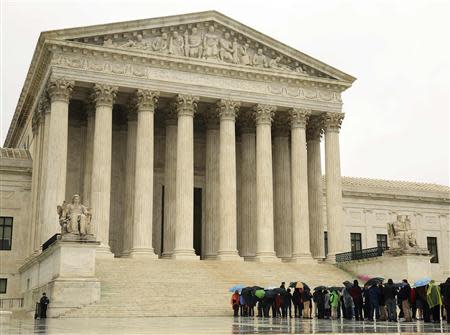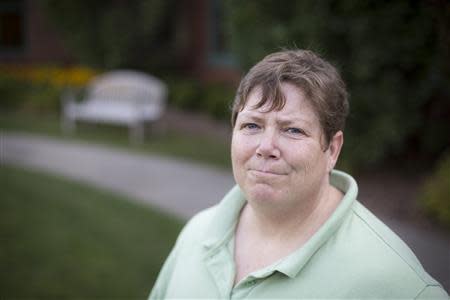U.S. Supreme Court backs prayer before government meetings
By Lawrence Hurley WASHINGTON (Reuters) - The U.S. Supreme Court on Monday gave local government officials across the United States more leeway to begin public meetings with a prayer, ruling that sectarian invocations do not automatically violate the U.S. Constitution. The court said on a 5-4 vote that the town of Greece in New York state did not violate the Constitution's ban on government endorsement of religion by allowing Christian prayers before monthly meetings. Although such prayers have long been a tradition in some communities, the high court had never before expressly said sectarian prayers could be constitutional in some circumstances or specifically held that prayers could be given before meetings of local government entities. In Monday's closely divided decision, the court said a prayer could violate the Constitution if there was an attempt to intimidate, coerce or convert nonbelievers. Politicians from both major political parties, including President Barack Obama, a Democrat, had backed the town. Kentucky Republican Mitch McConnell, the minority leader in the U.S. Senate, said in a statement the court had "reaffirmed the strong constitutional footing of this important American tradition." Although the ruling referred only to legislative prayer, it could give a boost to government officials seeking to promote religion in public life in other contexts, such as sectarian religious displays in civic buildings. Erwin Chemerinsky, a professor at the University of California, Irvine School of Law, who filed a brief opposing the Greece prayers, said the ruling "certainly reflects five justices who want to allow much more of a religious presence in government and government support for religion." The court was divided along ideological lines, with the conservative wing saying the prayers were acceptable, while the liberal justices said the prayers in question violated the First Amendment. The five justices in the majority are Roman Catholic. Of the four dissenters, three are Jewish and one is Catholic. Justice Anthony Kennedy, the court's swing vote, wrote the majority opinion. He said the town's prayers were consistent with the high court's 1983 precedent in a case called Marsh v. Chambers. That case made it clear that the long-standing practice of having prayers before state legislative sessions was lawful, based in large part on its historic nature. Kennedy gave short shrift to language in a 1988 case, County of Allegheny v. ACLU (American Civil Liberties Union), that suggested prayers must be nonsectarian. "To hold that invocations must be nonsectarian would force the legislatures that sponsor prayers and the courts that are asked to decide these cases to act as supervisors and censors of religious speech," Kennedy wrote. Although the policy in Greece, a town of 100,000 people, does not embrace a particular religion, all members of the public who gave a prayer were Christians until two residents filed suit in 2008. Some of the prayers featured explicitly Christian references, including mentions of Jesus Christ and the Holy Spirit. 'OFFENSE' VS 'COERCION' Residents Susan Galloway, who is Jewish, and Linda Stephens, an atheist, said in their lawsuit that the practice made them uncomfortable. The court focused on whether the content of the prayers constituted coercion. Finding there was none, Kennedy wrote that "offense ... does not equate to coercion." But the court did set some limits, with Kennedy saying prayers that "denigrate nonbelievers or religious minorities, threaten damnation or preach conversion" might not pass muster. Writing on behalf of the four liberals, Justice Elena Kagan said that for years the prayers in Greece were sectarian and the town did nothing to encourage members of other faiths to give the prayers. "In my view, that practice does not square with the First Amendment's promise that every citizen, irrespective of her religion, owns an equal share in her government," Kagan wrote. Bill Reilich, Greece's Republican town supervisor elected in November, was not in the office when the lawsuit was first filed and litigated but said he recognized some residents would be disappointed by the decision. "We are not forcing it on anyone," he said. "If they feel uncomfortable joining the prayer, they can have a moment of reflection instead." Greg Lipper, a lawyer with Americans United for Separation of Church and State, said the ruling was likely to have the most impact in towns with large Christian communities. "It definitely increases the leeway of local boards to impose majority religion," Lipper said. The case reached the high court after the 2nd U.S. Circuit Court of Appeals in New York ruled against the town in May 2012. A district court had previously supported the town's position by dismissing the lawsuit filed by Galloway and Stephens. The case is Town of Greece v. Galloway, U.S. Supreme Court, No. 12-696 (Additional reporting by Lindsay Dunsmuir in New York; Editing by Howard Goller and Grant McCool)


